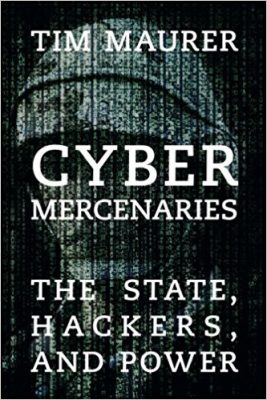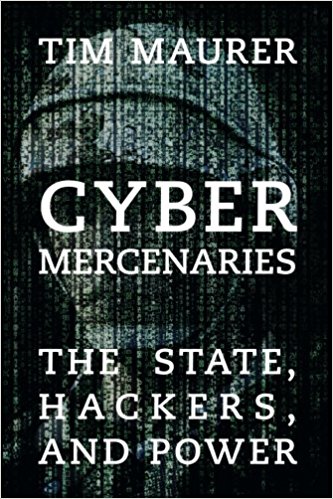 Author: Tim Maurer
Author: Tim Maurer
Publisher: Cambridge University Press – 246 pages
Book Review by: Sonu Chandiram
Secret and secretive relationships exist between some states and hackers, who have been using cyberspace as a new frontier, to gather information about the activities of their adversaries in their efforts to score points, acquire ‘coercive capabilities’ as the author Tim Maurer describes it aptly, and ultimately stay ahead in the game of global politics.
A study of major political and economic events in world history demonstrates that for millennia, information equates to power, particularly that which is not publicly known and can be used to coerce heads of state to say or do something that benefits their competitors or enemies. Cyberspace is one of the new places today to flex that political power.
The major players in this new era of geopolitics are: China, Iran, Russia (part of the former Soviet Union), Syria, and the United States. There are secondary players also, particularly in the Middle East. These states have different types of agreements with the hackers, based on how much control they maintain with them, termed ‘cyber mercenaries’ by the author.
The amount of control the states have on these mercenaries is described by the author as essentially being ‘on a tight leash’, being ‘on a loose leash’, or being ‘on the loose’.
We have made it easier for you to get a broad perspective on this book’s contents by listing the titles of its chapters below:
- Part I. Of Brokers and Proxies
- Cyber Proxies: An Introduction
- Proxies: An Instrument of Power Since Ancient Times
- Cyber Power: Geopolitics and Human Rights
- Part II. Cyber Proxies Up Close
- Cyber Proxies on a Tight Leash: The United States
- Cyber Proxies on a Loose Leash: Iran and Syria
- Cyber Proxies on the Loose: The Former Soviet Union
- Change Over Time: China’s Evolving Relationship with Cyber Proxies
- Part III. Implications
- The Theory: State Responsibility and Cyber Proxies
- The Practice: Shaping Cyber Proxy Relationship
- Conclusion: Cyber Proxies, the Future, and Suggestions for Future Research
There are risks inherent for states in using cyber mercenaries to gain points, but the alternative – not participating in the geopolitical war of gathering the most useful and most crucial knowledge about your adversaries – is even a worse situation to be in.
The risk is that once cyber mercenaries have gathered sensitive intelligence about a given state to sell it to another, there is no guarantee that these people will not also sell that same intelligence to another state, making it more difficult for any single state to gain a dominant position.
Adequately understanding the use of coercive power in cyberspace and how the technological tools are used in cyber war requires knowing or learning about the politico-religious systems of the major players. The relationships between the governments and the people in China, Iran, Russia, Syria, and the United States are as varied as one can imagine.
The author clarifies this point in the first chapter – Cyber Proxies: An Introduction – by writing: “Comparing the proxy relationships in existing cyber powers…requires a broader view of the state; it also requires us to revisit distinctions between private and public spheres that are blurred in countries where prebendalism reigns or where communist state structures and the party are still all-pervasive.”
Prebendalist states have political systems where elected officials, and government workers (part of the public sphere) feel they have a right to a share of government revenues, and use them to benefit their supporters, co-religionists and members of their ethnic group (belonging to the private sphere).
This is a well-researched and amply documented work that gives it much value. Maurer has accumulated and catalogued an extensive amount of information to document and support the discussions and points he makes in this highly insightful work. As a matter of fact, the Notes and Index sections at the end of this book comprises a full third of its length: 82 pages, from page 164 to 246.
This is a pioneering effort by Tim Maurer on how the cyber revolution has spawned information and intelligence brokers who trade and sell the secrets they’ve gathered to governments, adding new dimensions to the power play of global politics. I say this is a ‘must-read’ for heads of governments, the intelligence community, and members of the media who cover these areas. Given today’s headlines and top stories on U.S. news networks, it is a timely book as well.
Author:
Tim Maurer co-directs the Cyber Policy Institute at the Carnegie Endowment for International Peace in Washington D/C.. He is a member of several U.S. track 1.5 cyber dialogues and the Freedom Online Coalition’s cyber security working group. He co-chaired the Advisory Board of the 2015 Global Conference on Cyber Space, participated in the Global Commission on Internet Governance, and supported the confidence-building work of the OSCE.
His work has been published by Foreign Policy, the Washington Post, Time, Jane’s Intelligence Review, CNN, Slate, Lawfare, and other media and academic venues. He holds a Master’s degree in Public Policy from the Harvard University’s John F. Kennedy School of Government.







